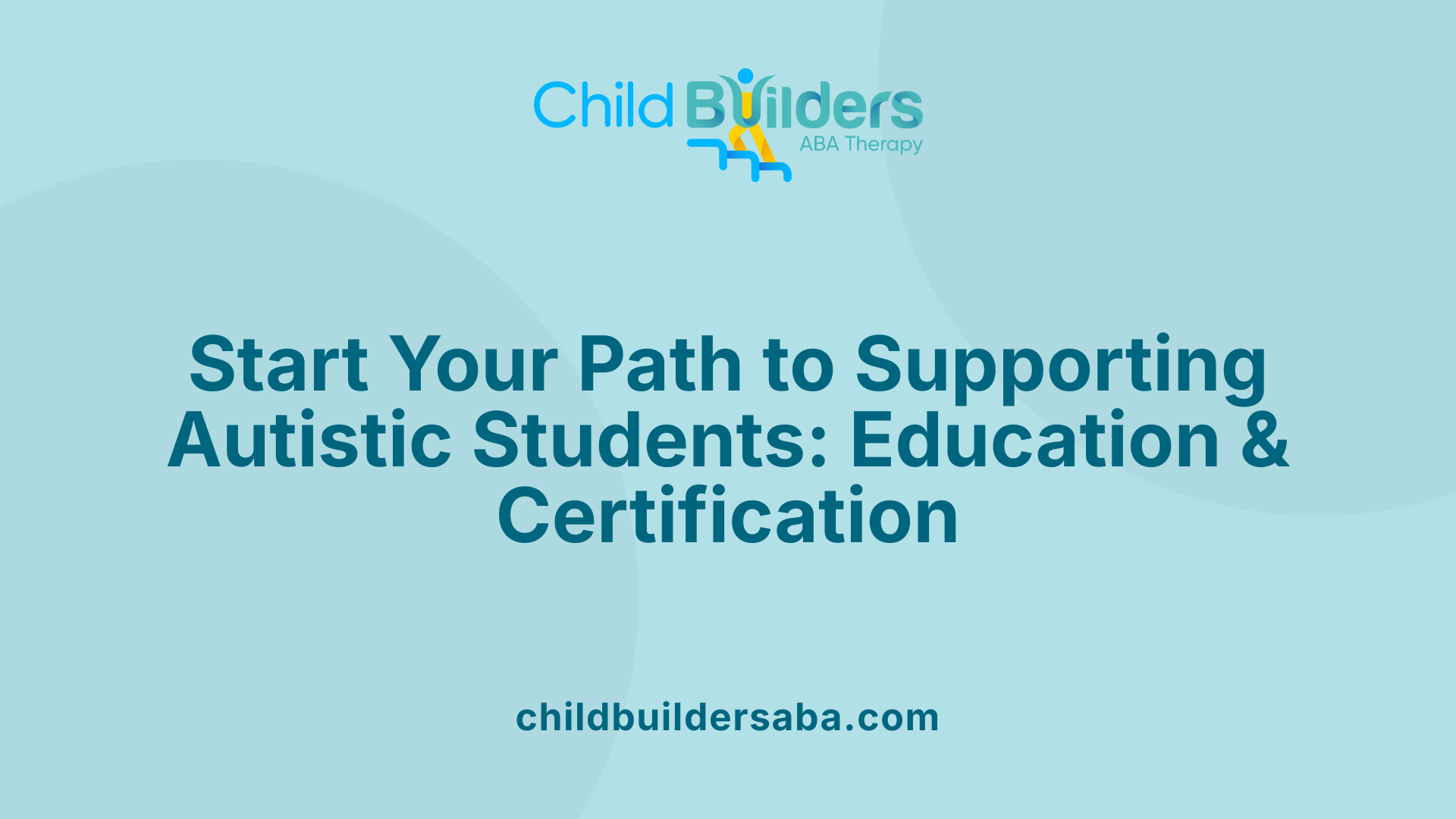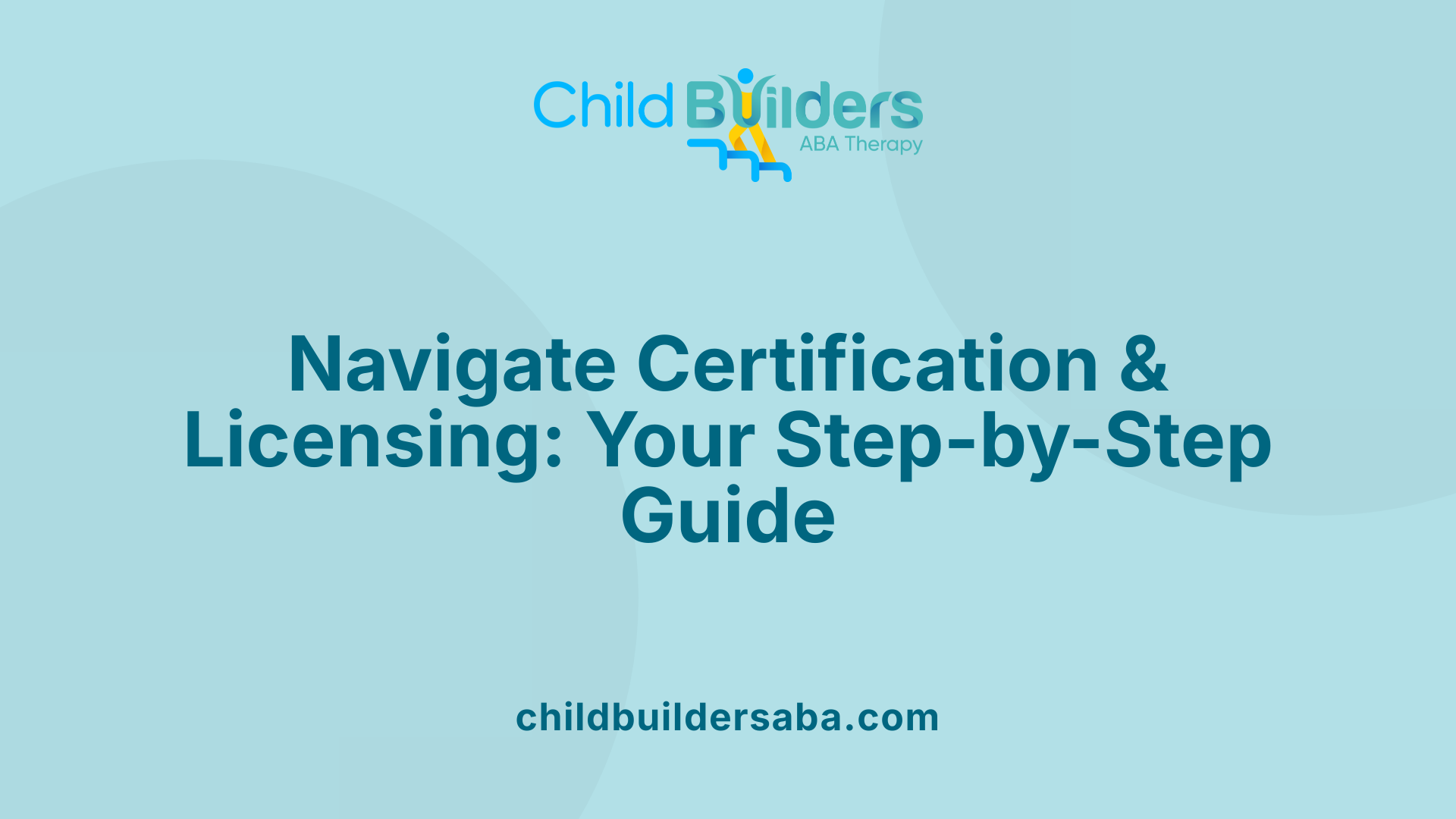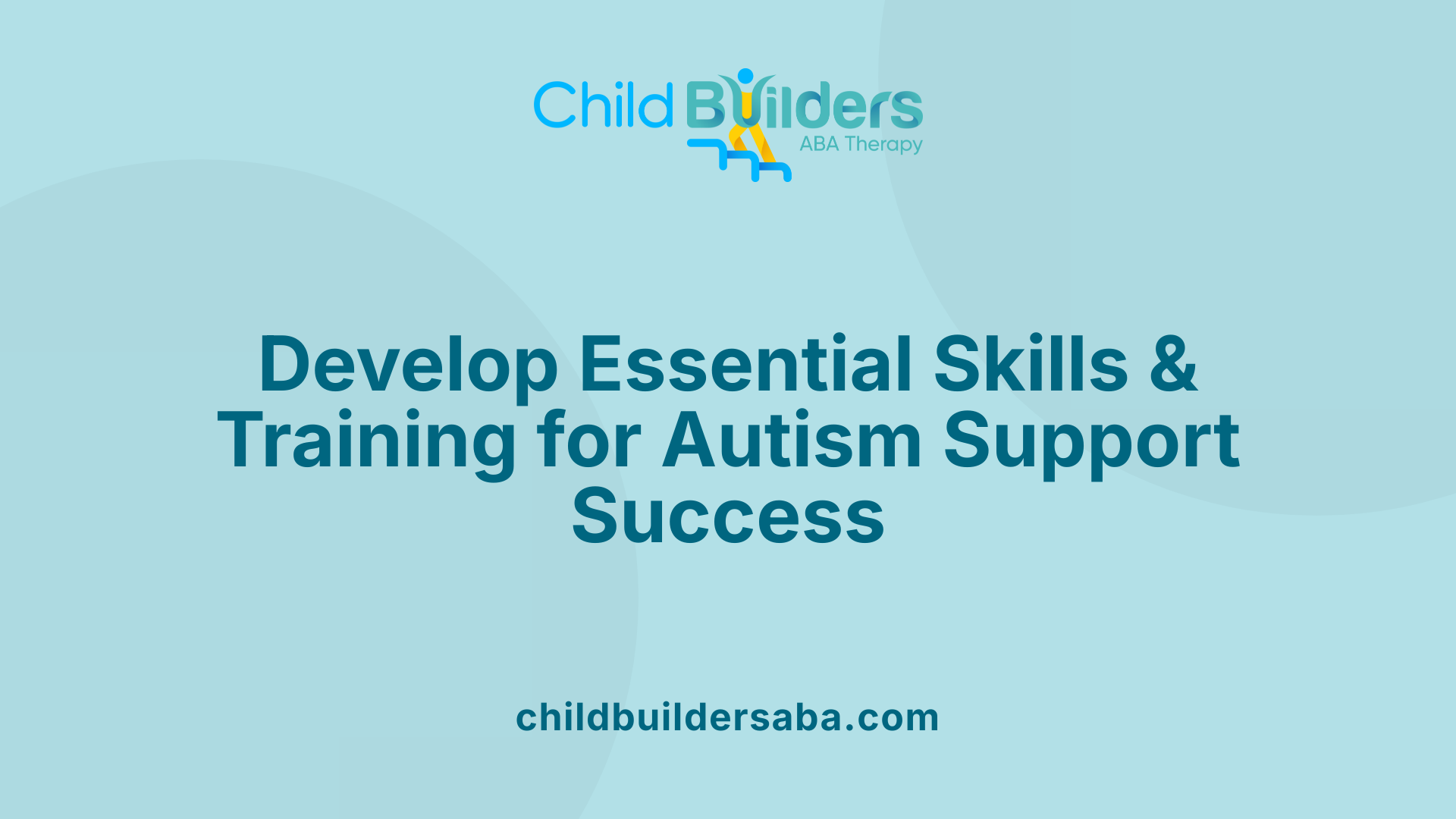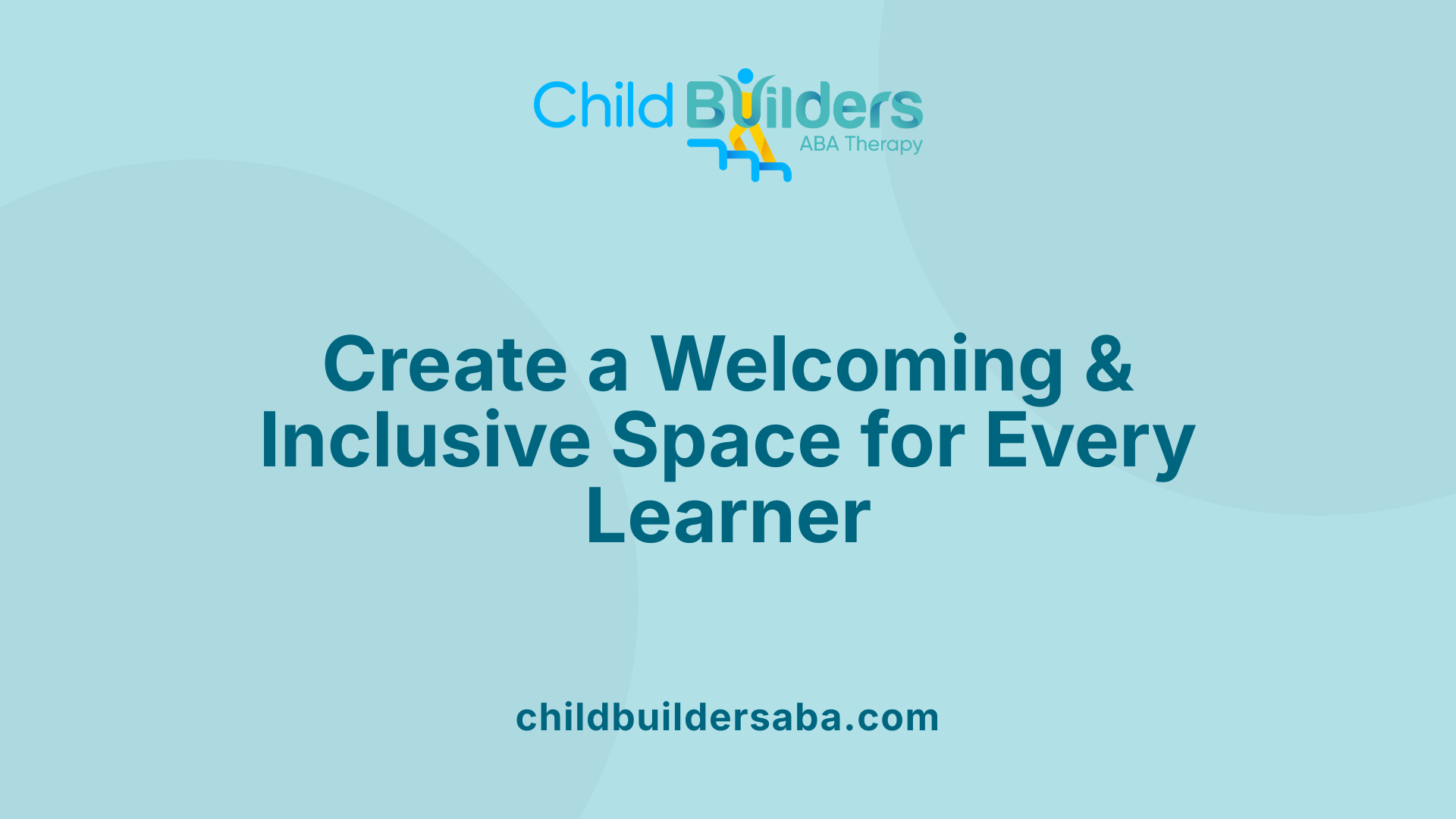How To Become an Autism Support Teacher

Understanding the Essential Steps and Qualities of Autism Support Teachers
Becoming an autism support teacher is a rewarding journey that combines academic preparation, specialized training, and a heartfelt commitment to fostering inclusive and supportive learning environments for students on the autism spectrum. This guide details the educational, certification, skill, and career aspects involved, providing aspiring educators with a comprehensive roadmap to enter this vital field.
Foundational Educational Qualifications

What are the educational requirements and qualifications needed to become an autism support teacher?
To pursue a career as an autism support teacher, obtaining a bachelor's degree is the fundamental first step. Typically, aspiring teachers earn this degree in fields like education, special education, psychology, or related disciplines. Around 39% of job postings in the field specify the need for at least a bachelor's level qualification, emphasizing its importance.
Many employers prefer or even require candidates to hold a master's degree in special education, autism, or similar areas. Pursuing advanced education, such as a Master of Education (M.Ed.), is beneficial as it offers specialized training in assessment techniques, behavioral interventions, and evidence-based strategies crucial for supporting autistic students.
In addition to formal degrees, certification or licensure is a necessary component. The specific requirements for licensing or certification depend on state regulations and vary across regions. Therefore, candidates should carefully research the licensing process applicable locally.
Key skills vital for success include a solid understanding of Individualized Education Programs (IEPs), effective classroom management, patience, empathy, and familiarity with autism spectrum disorder and intervention methods like Applied Behavior Analysis (ABA).
Practical experience through clinical placements or internships, combined with specialized training related to autism spectrum disorders, significantly enhances one’s ability to effectively support students with autism and increases job prospects.
In summary, the pathway involves earning a relevant bachelor's degree, obtaining state certification, acquiring specialized autism training, and gaining classroom experience to develop the competencies needed for this rewarding career.
Certification and Licensure Processes
 Becoming an autism support teacher involves a series of certification and licensure steps that vary by state. Generally, teachers must first obtain a teaching license in special education or a related field such as psychology or early childhood education. This requires earning at least a bachelor's degree from an accredited program, often in elementary or special education, and completing supervised student teaching experiences to gain practical classroom skills.
Becoming an autism support teacher involves a series of certification and licensure steps that vary by state. Generally, teachers must first obtain a teaching license in special education or a related field such as psychology or early childhood education. This requires earning at least a bachelor's degree from an accredited program, often in elementary or special education, and completing supervised student teaching experiences to gain practical classroom skills.
Most states require applicants to pass licensing exams tailored to their jurisdiction, such as the GACE in Georgia or the Praxis series in many other states. Background checks are also mandatory to ensure suitability for working with children. Many prospective teachers pursue a master's degree in education or a specialized field like autism spectrum disorders to enhance their qualifications.
In addition to licensing, teachers can seek specialized certifications to demonstrate expertise in autism support. The International Board of Credentialing and Continuing Education Standards (IBCCES), for example, offers the Certified Autism Specialist credential. To earn this, candidates must complete specific training programs focused on autism, pass an exam, and meet experience and continuing education requirements.
Ongoing professional development is vital. Many states and certifying bodies require teachers to pursue workshops, courses, or certifications regularly. This continued learning helps educators stay updated on research-based practices and emergent strategies in autism education.
| Certification Type | Requirements | Additional Notes |
|---|---|---|
| State-specific teaching license | Bachelor’s degree, student teaching, exams, background check | Varies by state, some may prefer a master's |
| Master’s in Education or related field | Advanced degree, often preferred or required | Can increase job opportunities |
| Autism support certification (e.g., IBCCES Certified Autism Specialist) | Specialized training, exam, experience, CE hours | Focuses on autism-specific knowledge |
For aspiring autism support teachers, understanding and fulfilling these certification and licensure processes is an essential first step toward a rewarding career dedicated to supporting students on the spectrum.
Skills and Training Essential for the Role

What skills and training are necessary for effective autism support teaching?
Autism support teachers need a blend of specific skills and extensive training to foster productive learning environments for students on the spectrum. Strong communication abilities are vital, as teachers must convey instructions clearly and understand students' unique ways of expressing themselves.
Patience and empathy are equally important, enabling educators to build trusting relationships with their students and respond to their needs compassionately. Understanding autism spectrum disorders—including sensory sensitivities, social challenges, and focused interests—helps teachers tailor support effectively.
To implement best practices, autism support teachers often undergo specialized training in evidence-based strategies such as Applied Behavior Analysis (ABA), Discrete Trial Training (DTT), and Pivotal Response Training (PRT). These methods require ongoing coaching and professional development to be effective and consistently applied.
Creating visual supports like picture schedules, social stories, and predictable routines helps students navigate their day and develop communication skills. Visual aids and structured environments also assist in reducing sensory overload and maintaining engagement.
Continual professional growth through workshops, certifications, and collaboration with specialists ensures teachers stay current on new research and approaches. Certifications like the Certified Autism Specialist (CAS) are additional credentials that enhance a teacher’s ability to support their students.
Overall, the role demands a proactive approach to learning, patience, and a deep commitment to improving the educational experience for children with autism. Developing these skills and engaging in lifelong learning are crucial for delivering effective, individualized support.
Core Responsibilities and Daily Duties
What are the primary job responsibilities of an autism support teacher?
Autism support teachers play a vital role in the education of children on the autism spectrum. Their main duty is to develop and implement individualized education programs (IEPs) that meet each student's specific needs. These plans outline personalized goals and accommodations to support learning.
Beyond planning, these teachers provide direct instruction in academic subjects, while also focusing on social, emotional, and practical life skills. They often work with students in small groups or individually to foster a supportive environment.
Monitoring student progress is crucial. Autism support teachers regularly assess how students are doing relative to their IEP goals, making adjustments to teaching strategies and interventions as necessary. This adaptive approach helps ensure students are making meaningful progress.
Collaboration is central to the role. Autism support teachers work closely with families, general education teachers, specialists, and other staff members. This teamwork helps create a consistent learning experience and ensures that all support strategies are aligned.
In addition to instructional duties, these teachers serve as behavioral consultants. They conduct functional behavior assessments to understand challenging behaviors and develop tailored behavior intervention plans. To support staff and family members, autism support teachers often provide training on effective teaching and behavioral management techniques.
Overall, their work combines education, assessment, behavioral support, and teamwork to help children with autism reach their full potential in school and beyond.
Career Outlook and Salary Expectations
What is the career outlook and salary expectation for autism support teachers?
The future for autism support teachers looks promising. With increasing diagnoses of autism spectrum disorder, the demand for qualified educators in this field is expected to grow steadily. The U.S. Bureau of Labor Statistics estimates an employment increase of approximately 8.3% for special education teachers, including those specializing in autism, from 2020 to 2030. This growth reflects a larger need for tailored educational services to meet students' diverse needs.
Regarding earnings, salaries for autism support teachers vary depending on factors such as experience, educational level, and geographical location. The median annual salary in the United States ranges from about $55,980 to $67,190. Entry-level positions often start around $35,170, but experienced teachers with advanced certifications or working in specialized settings can earn over $84,000 a year.
Salary differences can also be seen based on work settings. For example, autism support teachers in elementary schools earn roughly $56,490 annually, while those in secondary schools make approximately $57,820. Teachers working in health practitioner offices or private clinics tend to earn higher, around $63,040 or more.
Because of the rising prevalence of autism, job prospects remain strong. The need for qualified educators who can develop individualized education programs (IEPs), employ effective teaching strategies, and foster inclusive environments supports a stable and rewarding career outlook. Overall, autism support teaching combines meaningful work with competitive compensation and excellent growth opportunities.
Effective Strategies and Best Practices for Supporting Autistic Learners
What strategies and best practices are recommended for supporting autistic students?
Supporting students on the autism spectrum involves a tailored approach that addresses their unique needs to foster learning and social development. One foundational element is the use of visual supports, such as picture schedules and social stories, which help students understand routines and expectations. Structured routines provide predictability, reducing anxiety and creating a safe learning environment.
Sensory accommodations are also crucial. Many autistic children are sensitive to sensory stimuli, so creating sensory-friendly spaces and offering choices during transitions help them stay regulated and engaged. Classroom modifications like flexible seating, noise-canceling headphones, and designated calm areas support their sensory needs.
Creating a respectful classroom environment heavily relies on positive interactions. Teachers use visual cues, clear and simple communication, and modeling respectful behavior to promote understanding. Encouraging social interactions through structured activities can help develop social skills and peer relationships.
Partnerships with families and other professionals enhance support. Regular communication ensures that educational strategies align with students' needs outside the classroom, and teamwork allows for comprehensive programming.
Utilizing evidence-based practices fortifies teaching efforts. Approaches such as TEACCH, which emphasizes structured teaching and visual supports, and programs like Incredible Years, focused on social and emotional skills, are effective tools supported by research.
Additional strategies include sensory-friendly transitional supports, offering choices to increase autonomy, and gradual exposure to environmental changes. All these practices are guided by non-punitive, person-centered principles, emphasizing positive reinforcement, respecting individual preferences, and supporting overall well-being.
Implementing these strategies requires ongoing professional development for educators, an understanding of autism, and commitment to fostering inclusive, supportive classrooms that promote the success and happiness of autistic learners.
Building a Professional Network and Continuing Education
 Autism support teachers thrive by actively engaging in ongoing professional development and community involvement. Attending conferences, workshops, and participating in online courses are excellent ways to stay current with the latest research, teaching strategies, and best practices in autism education. These learning opportunities often feature expert speakers and provide networking chances with peers.
Autism support teachers thrive by actively engaging in ongoing professional development and community involvement. Attending conferences, workshops, and participating in online courses are excellent ways to stay current with the latest research, teaching strategies, and best practices in autism education. These learning opportunities often feature expert speakers and provide networking chances with peers.
Engagement with autism support organizations can also enrich teachers’ expertise. These organizations offer resources, training programs, and forums for sharing experiences. Connecting with groups like Autism Speaks can enhance understanding and foster collaborations.
Staying updated on research and new methods is crucial in this evolving field. Teachers should regularly review scholarly articles, attend webinars, and participate in specialized certifications like ABA or CBAC to expand their skill set.
Additionally, mentoring opportunities help seasoned teachers guide newcomers, exchange ideas, and develop leadership skills. Many districts offer mentorship programs, which benefit both mentors and mentees.
Overall, continuous learning and active networking ensure autism support teachers provide the most effective, informed support for their students, fostering a more inclusive and supportive educational environment.
Creating an Inclusive and Supportive Classroom Environment

Sensory adjustments and environmental modifications
Autistic students often experience sensory sensitivities that can affect their comfort and ability to learn. Teachers can create a more inclusive classroom by making sensory-friendly adjustments. This includes providing quiet areas where students can retreat if overwhelmed, using soft lighting, and minimizing loud or distracting noises. Classroom tools like noise-canceling headphones or fidget toys can also help students regulate their sensory experiences.
Promoting social inclusion and peer interactions
Fostering positive social interactions is vital. Teachers can encourage peer buddies, structured group activities, and social skills programs to promote inclusivity. These strategies help autistic students develop friendships, improve communication skills, and feel valued within the classroom community.
Respecting communication preferences and presuming competence
Understanding and respecting each student's preferred communication method—whether verbal, visual, or alternative—builds trust. Teachers should always presume competence, meaning they assume students can understand and participate, which encourages confidence. Using visual supports or sign language can facilitate communication and ensure students' needs are acknowledged.
Fostering a nurturing and respectful classroom culture
A respectful environment supports emotional well-being. Teachers should establish clear routines, model patience, and celebrate diverse ways of learning and expressing. Building a classroom culture grounded in acceptance, kindness, and collaboration helps all students thrive and feel safe.
| Strategy | Practical Example | Expected Benefit |
|---|---|---|
| Sensory adjustments | Quiet corner, noise-canceling headphones | Reduced sensory overload |
| Social inclusion | Peer buddy system | Enhanced social skills and friendships |
| Communication respect | Visual schedules, sign language | Improved understanding and participation |
| Respectful culture | Classroom agreements on kindness | Positive relationships and safety |
Embarking on a Rewarding Educational Journey
Pursuing a career as an autism support teacher is both a noble and fulfilling endeavor that relies on a solid foundation of education, continuous learning, and genuine compassion. By understanding the necessary qualifications, certifications, skills, and best practices, aspiring educators can effectively support and inspire students on the autism spectrum. Dedication to ongoing professional development and fostering an inclusive school environment ensures these educators can make a meaningful difference in their students' lives, advancing not only their careers but also promoting greater acceptance and understanding within the wider community.
References
- Job Profile: Autism Support Teacher - Top Education Degrees
- How To Become an Autism Support Teacher - ABATherapistJobs.com
- Careers in Teaching Children with Autism - Learn.org
- How general education teachers can support students with ASD
- Autism in the classroom: Strategies for success
- Effective Classroom Strategies for Teaching Students with Autism
- Supporting Students with Autism: 10 Ideas for Inclusive Classrooms

























.jpg)











































































